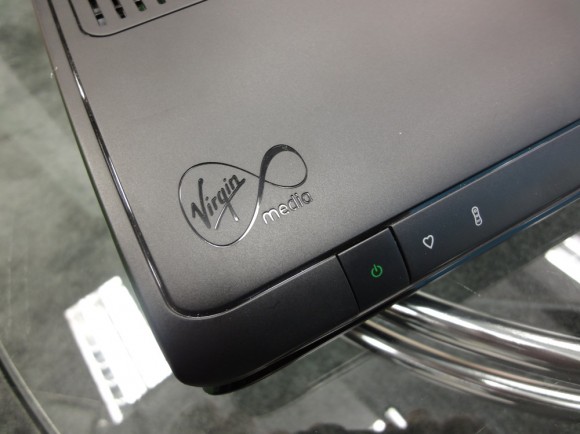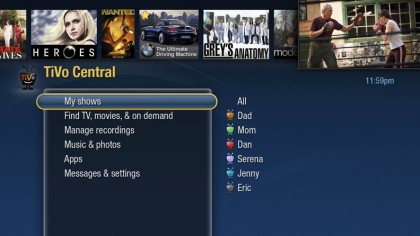
Over on the TiVo Community, one member who identifies himself as representing Virgin Media Customer Relations has posted a long list of possible VM TiVo enhancements. Amongst the bullet points…
As you might expect, UK customers will ultimately receive access to the iPad app we currently enjoy here in the US. However, it appears TiVo To Go is not a can of worms that Virgin (or TiVo) is prepared to open in their market. We know TiVo-to-TiVo streaming is in the works and Virgin’s down for a 2011 or 2012 update to enable multiroom viewing. Interestingly, “Keir” alludes to personalized Sezmi-esque recording queues (twice!) that TiVo inadvertently leaked via screengrab at the Premiere launch:

Keir provides various other details in his post, but they may only appeal to Virgin Media customers or TiVo investors. And please take it all with a grain of salt, as I can’t vouch for his identity or the information. However, in an exchange I had with him over the weekend, Keir indicates the info was emailed to him via a VM colleague “who deals with the TiVo team” and there’s nothing truly outlandish here. Making it all the more believable.
You always figure a fake would be more exciting. 16 tuners, and it’s the first with Netflix in the UK!
“However, it appears TiVo To Go is not a can of worms that Virgin (or TiVo) is prepared to open in their market.”
TTG only exists because it was created by the CableCARD mandate in the 1996 US Telecommunications Bill. (Thank you, Reed Hundt.)
Since CableCARD is US only, TTG is not likely to ever head across the pond.
Back in the USA, we continue to live in the golden age of CableCARD, even if folks looking 10 years out are no longer interested.
“You always figure a fake would be more exciting. 16 tuners, and it’s the first with Netflix in the UK!”
The difference between TiVo US and Virgin Media is that Virgin Media doesn’t seem as interested in promoting vaporware and vaporous timing guidelines.
Virgin Media seems more interested in promoting reality.
CableCARD and TiVoToGo have absolutely nothing to do with one another and there’s no relation to FCC guidance. In fact, TiVo To Go predates TiVo’s CableCARD implementation and at Series3 launch it wasn’t certain that CableLabs would certify offloading content. As I’ve said elsewhere, the fact that TiVo attempts to restrict resolution (especially at launch) and is a bit player, they’ve managed to stay off the radar with this one. If they were to introduce it today, it could get ugly. Also, folks on Cox, Time Warner, a few others can’t actually use TTG due to their heavy handed usage of the Copy Once CCI Byte.
“CableCARD and TiVoToGo have absolutely nothing to do with one another and there’s no relation to FCC guidance.”
I’m prepared to believe you, but then where does the legal requirement for the CCI byte on OTA content come from?
OK. After further research, I’m going to stand my ground on this one until my thinking is shown to be incorrect.
The rules on the CCI byte are set by the FCC in the FCCs Plug and Play agreement in 2003.
That agreement, (you can download the PDF from the above Wikipedia link), is in furtherance of “Implementation of Section 304 of the Telecommunications Act of 1996”.
So the implementation of TTG for CableCARD really is part of the 1996 mandate. And further, that mandate is why Verizon is free to set the CCI byte as they do. If the content companies were to attempt to force Verizon to change their policy through either threats or inducements, those content companies would likely be in violation of a boatload of criminal and civil statutes.
So, as always, while TTG is protected by the fact that the audience is minimal, were TTG to go more mainstream, it would still have a good shot at thriving, since it has a legal safe-harbor.
TTG is irrelevant to everyone’s planning only since they’re planning for the age after CableCARD, which will eventually come, but just not for a while. In the meantime, we continue to live in the golden age of CableCARD…
Yes, but nothing in that act or guidance requires TiVo to offer TiVoToGo. Content companies could surely force the matter that providing the recordings beyond the DVR is inappropriate, unintended, unlicensed. (And I believe HBO has.) Furthermore, we know TTG is also insecure as TiVo’s encryption has been cracked – providing source full resolution digital material. Given TiVo’s footprint and the technical knowledge required, I don’t think anyone has made an issue out of it (which would draw more interest and attention). Of course the tides are changing and iPad streaming will force content providers to loosen up. Back to the CCI Byte, there’s some indication that the likes of Comcast, Verizon, etc are prohibited from encrypting the locals. But even that is debatable.
“Content companies could surely force the matter that providing the recordings beyond the DVR is inappropriate, unintended, unlicensed.”
Yes and no.
Yes, in that they already do. Most of the largest coax MSO’s are content companies to one degree or another, which is why they are more restrictive about the CCI byte than Verizon, which doesn’t have any interest in content companies.
No, in that the 2003 agreement creates an explicit legal safe-harbor for taking recording off of a CableCARD DVR with CCI byte control permission, and that the 2003 agreement gives control over the CCI byte to the MSO, not the content companies.
“Furthermore, we know TTG is also insecure as TiVo’s encryption has been cracked – providing source full resolution digital material.”
As mentioned in a previous thread on the topic, DVD and Blu-Ray have also been long cracked, providing full resolution digital material (in Blu-Ray) of a digital quality far beyond what TTG provides, yet the content companies are still happily create, promote, and sell as many of these cracked formats discs as they can.
Add in the fact that recent Hollywood releases, (which is where the money’s at), are windowed to come out on the cracked Blu-Ray format well before they appear in the inferior quality cracked TTG format, and I don’t think the content companies are losing a single minute of sleep over the fact that TTG is as insecure as Blu-Ray.
“Back to the CCI Byte, there’s some indication that the likes of Comcast, Verizon, etc are prohibited from encrypting the locals. But even that is debatable.”
If you put enough well-paid lawyers in a room, anything is debatable. But the 2003 FCC order is pretty clear on where the CCI byte must be lawfully set on OTA recordings.
“Of course the tides are changing and iPad streaming will force content providers to loosen up.”
Maybe. Maybe not. Until the FCC starts getting AllVid or something like it beyond the drawing board stage, it’s the wild west out there in stream-land. There are no rules. There are only outlaw gangs with quickdraw lawyers instead of gunmen.
“nothing in that act or guidance requires TiVo to offer TiVoToGo.”
Of course. But the 2003 agreement allows TiVo to do so, and with that safe-harbor, why wouldn’t they?
TiVo gets customers out of that safe-harbor, and despite all evidence to the contrary, I’d assume TiVo likes having customers better than the alternative.
TTG wasn’t cracked, it was BYPASSED since it was trivial to do so given that they provided a DirectX filter that decoded the damn things.
Yes, I’m being picky.
Glenn, that was true for like the first 2 or 3 years when we used things like GraphEdit to redirect the content. However, TiVoToGo really was cracked, which resulted in tivodecode:
http://tivodecode.sourceforge.net/
And that’s what more well rounded programs like the cross platform kmttg lean on for decryption:
http://code.google.com/p/kmttg/
“However, TiVoToGo really was cracked, which resulted in tivodecode”
Just as with DVD and Blu-Ray, it was inevitable that TTG would be quickly cracked.
It’s impossible to create a “code a file once, decode on multiple consumer devices” scheme that isn’t quickly cracked.
The only way to have such a system not quickly cracked is to put all the DVD Jon’s of the world in jail while censoring the publication of their results, which society has (correctly) not been willing to do.
The nice thing about the whole functional system is that only a tiny fraction of users will bother with cracking their material, since companies aren’t permitted to profit by selling cracking tools to make it mass-consumer friendly. So at that point, the only problem with decrypted coding systems is a P2P problem, and TTG material is not first choice for P2P source material for a variety of reasons. So the cracking of TTG really isn’t a problem for the content companies.
(If the audio content companies had bothered to put an easily crackable protection system on CD’s when they devised the format, there would’ve been no commercial “Rip, Mix, Burn” iPod/iTunes revolution, and the audio content companies wouldn’t have gotten hit as they did.)